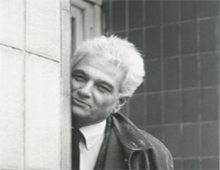García Düttmann, Alexander (1961-.... ; philosophe)
Professeur de philosophie et de culture visuelle, Goldsmiths college, University of London. Ecrit en allemand. Né à Barcelone, Espagne
Alexander García Düttmann studied Philosophy in Frankfurt as a student of Alfred Schmidt and a pupil of Theodor Adorno; and in Paris as a student of Jacques Derrida. After obtaining his PhD from Frankfurt, he spent two years at Stanford University as a Mellon Fellow. His first academic position in the UK was a lecturership in Philosophy at Essex University. Currently he is Professor of Philosophy and Visual Culture at Goldsmiths, University of London. He has taught in Melbourne, at Middlesex University, where he was Professor of Philosophy for seven years, and at New York University, where he was a visiting professor in the autumn term of 1999. Düttmann's main achievements consist of his publications. He has published a number of authored books, many of which have been translated into several languages (English, Italian, Japanese).
His most recent publication is a book called Derrida and I: The Problem of Deconstruction, published in German by Transcript Verlag (Bielefeld 2008). Alexander Düttmann lectures internationally, and has repeatedly taught courses on art theory in Spain, especially at the Universitat Autònoma de Barcelona and Universidad Politècnica de València (MA Theory of Photography).
Vidéos
Héritages et survivances de Jacques Derrida. Séances de l'après-midi - 8 novembre 2014. Partie 1
Héritages et survivances de Jacques Derrida, pour dire ce qui arrive à sa pensée et à son oeuvre, tout autant que ce qui en provient, et qui revient et reviendra. Dix ans après la mort du philosophe,

